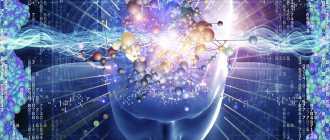Introspection is a method of conscious self-observation. The name comes from the Latin (introspecto) and means to look within. Introspection and introspection are synonymous and both methods are used in psychological research. The importance of this method cannot be overestimated, since with its help it is possible to deeply learn to perceive reality and then his consciousness and intuition are revealed to the individual. Schizophrenics have excessive introspection; they replace the real world with their own inner world.
The method of introspection in psychology is used for a person to observe his own mental processes and is carried out without the help of any tools or means, only through his own consciousness.
Introspection in psychology is a thorough knowledge and study by an individual of his own thoughts, feelings, experiences, activities of the mind, images, attitudes, and so on. The method of introspection in psychology was founded by J. Locke.
Introspection is a subjective analysis in which a person does not strive for self-condemnation, which is how this method differs from remorse.
Introspection in philosophy is a method of introspection on which retrospective philosophy is based to achieve reflexive liberation of consciousness and the hierarchy of feelings in the structure of the personality. Too much introspection or a tendency towards in-depth introspection can contribute to the formation of a suspicious attitude towards other individuals and the entire world around us. Dualistic philosophy separates material nature and spiritual nature (consciousness), therefore introspection in philosophy is the basis of psychological methodology. It was of great importance for a large number of philosophers: J. Locke, J. Berkeley, T. Hobbes, D. Hume, J. Mill and others. They all considered consciousness to be the result of internal experience, and the presence of feelings and experiences indicated knowledge.
Method of introspection
Introspection is reflection, that is, a person’s focus deep within himself, which differs from his focus on the outside world. The main method of introspection is self-observation. But there is a flaw here - no one can evaluate the correctness of a person’s work during introspection, because in essence a person is engaged in subjective observation. He evaluates himself in a way that suits him. Here you can resort to various forms of psychological defenses in order not to notice certain qualities in yourself.
Introspection methods are divided into types:
- Analytical - analysis of feelings and emotions into parts, details, examining them down to the smallest detail.
- Systematic – analysis of one’s feelings and thoughts after performing specific actions, that is, after the fact.
- Phenomenological – a description of one’s internal state without experiencing it traumatically.
To cope with any, even the most difficult situation, it is very important to understand your own feelings. When you realize that you are angry, bored, offended, etc.
etc., then it’s easy for you to determine the reason for this feeling, and then communicate with yourself about how objective these reasons are.
In fact, you may not be angry where you would normally be angry; do not be offended where you are usually offended; not to be afraid where you are used to being afraid, etc. But to do this, you must first trace these feelings in yourself, understand the reasons for their occurrence and realize how stupid, childish or unnecessary they are sometimes. You can work on not reacting negatively to certain events. Why be upset again? After all, life can be made a holiday if you understand that many troubles happen for harmless reasons.
Even if the reason for your grief is serious and objective, you also have the right not to be upset about it. Who told you that you should cry if someone dies? To whom do you owe grief if a loved one leaves you? Even if the reasons are serious, you can say to yourself: “Yes, the situation is unpleasant, I want to cry, take revenge, beat my offender. But I may not react to this situation at all. What happened happened. I just won’t think about it, but will continue to live my happy life.”
Let your life be independent of what other people do. Become the master of your own happiness, which depends only on what you do. Unpleasant situations may happen to you, but you have the right to choose what feelings and emotions to experience. After all, you can rejoice at the departure of your loved one (“Now I won’t have to do what only he (she) wanted, and be what he (she) wanted me to see”; you have gained freedom to express yourself) or be indifferent to the fact that you were not promoted (“And thank God. But I will be able to spend more time with the people I love”).
Find the positive in a situation that is usually perceived negatively. And remember that you are free to choose not only your feelings, but also the people with whom you will continue to communicate, the places you will visit in the future. You are not obligated to maintain relationships with those people who deprive you of happiness and joy. It is better to be alone than to communicate with those who parasitize on your desire to achieve success and perfection.
Main features
You can recognize synthetics by the following features:
Developed intuition
Synthetics often cannot explain why they are confident in a particular development of events, but their premonitions very rarely deceive them.
Losing details from sight, inattention to them. It is difficult for synthetics to go from the particular to the general; specifics interest them only if it helps to better understand some features of the general.
The ability to “grab” information “on the fly”, quickly understand the essence
Synthetics subtly sense the interlocutor, often giving the impression of people who seem to read minds.
The ability to see patterns within the whole. An analytical doctor treats a specific disease and relieves its symptoms, while a synthetic doctor tries to understand the cause of the disease and its effect on the functioning of other organs.
The predominance of the right hemisphere, responsible for intuitive, imaginative, visual perception. You can check which hemisphere is dominant in you using a simple test, which is described in the video below.
What is introspection?
Introspection is a way of turning a person deep into himself for the purpose of self-knowledge. This is introspection, self-knowledge, introspection with the goal not to judge or evaluate, but with the goal of understanding oneself. This is how introspection differs from remorse, when a person begins to delve into himself, and then negatively evaluate his motives and actions, considering them wrong.
Introspection is a way to know yourself. To do this, a person must simply observe his mental processes, the emergence of desires, emotions, etc. There is no need to evaluate or condemn anything here. You just need to watch. If you do everything correctly, then you can not only understand yourself, but also realize why you made so many mistakes, what controls you. When a person understands himself, he can change in the direction in which he himself wishes.
In order to accept yourself as you are, you need to start with forgiveness. All people make mistakes. Sometimes a person blames himself more than other people do. Sometimes only you consider yourself to blame for something, and other people do not hold a grudge against you at all. Therefore, you need to forgive yourself first to see whether other people blame you or not.
When apologizing to someone, people sometimes do not forgive themselves. How can you be forgiven if you blame yourself for everything? Other people may have forgiven you a long time ago, but you continue to think that they are offended by you. Do you know why this happens? Because you blame yourself and from this you transfer your thoughts to other people. Everyone has already forgiven you, but it seems to you that they are offended at you because you do not forgive yourself. This is called "transference" when you project your own thoughts onto other people, thinking that they think about you in the same way as you think about yourself.
Forgive yourself first. Sometimes you don't need to ask other people for forgiveness. Sometimes you don’t need to waste your time and nerves seeking forgiveness from others. The most important thing is not to blame yourself. As long as you blame yourself and don’t forgive, even other people’s apologies won’t help you. But if you forgive yourself, then you may not even need the words “I forgive” from others.
The most important thing is to forgive yourself. Then it becomes clear whether you need to spend time seeking forgiveness from other people or whether they have already forgiven you a long time ago.
During the introspection process, it is important not to overdo it. After all, a person can go to the other extreme - self-examination
You need to not evaluate yourself, condemn or praise yourself, but simply get to know yourself, as if observing from the outside. If you begin to engage in self-examination, you will be guided by the desire to find some kind of flaw in yourself and reproach yourself for its presence.
How to improve the accuracy of the method?
To increase the accuracy of the introspection method, you need to consider a number of recommendations:
- When conducting self-observation, you should put aside any activities and try to unload. You need to do your usual activities, communicate with family, friends, go to work.
- You should not try to observe yourself in moments of strong emotions, during depression, apathy, or after disturbing events that had a negative impact on the person’s condition.
- You must carry a voice recorder or notebook with you everywhere. They are needed to note information about the manifestations of the psyche at different moments in life. If you try to memorize data and mark it later, your idea of it will change and cannot be considered accurate.
- It is recommended to be interested in your behavior and the expression of emotions in others. It is better if this one is relatives. This way you can compare your own thoughts about yourself with the thoughts of others. It is important that the position of others does not change the view.
It is recommended to read in advance about the manifestation of different feelings and emotions so that it is clear what and how to celebrate. You also need to ask questions of interest to a psychologist, who will be provided with the data obtained, so as not to be distracted when conducting self-observation.
Modern psychology, introspection and reflection
In current conditions, introspection is perceived as a historical stage in the development of psychological experiments. Now psychologists conduct research exactly the opposite. By analogy with the classic example of early psychology, in which introspection occupied a dominant place, the same object is taken - a red apple. But the subject must say what exactly he is holding in his hand, without going into analytical detail. This is the only way to analyze the psychological state of a person at the time of the experiment. Analytical introspection and introspection today are different concepts. Comprehension of the facts of one’s own consciousness is called monospection, and reflection is replaced by direct knowledge.
An experimental psychologist, when conducting a test task, relies on his own sophistication of the mind, and not on the intricate conclusions of the subject. Only in this respect the method of introspection is used as a tool of one’s own knowledge, and the data of introspection represent nothing more than professional experience.
Regarding the theory of dual consciousness, psychiatrists have a slightly different opinion, which is expressed in a clear formulation - schizophrenia. As for self-knowledge, it has nothing to do with introspection.
Advantages and disadvantages
Positive aspects of self-observation:
- The research process is closed from external observation.
- To conduct it, you do not need to create certain conditions, use specialized equipment, or involve a team of psychologists who would control the experiment.
- Conducting research will help in self-improvement and achieving your goals.
- A person can study his own behavior, emerging thoughts, strengths, weaknesses, character traits, habits.
If we talk about shortcomings, there is only one - the variability of the results of self-analysis depending on preferences and character traits. Because of this, this research method has been criticized by scientists. A person can forgive himself a lot. This leads to distorted results.
Description of the method
Introspection is very useful in a person’s knowledge of himself and his activities. This method is practical and does not require additional standards or tools. Its most significant advantage over other methods is that no one in any way can get to know a person better than he knows himself.
The method is very good because a person only needs his own help and desire. He must want to know himself and devote time to this.
But the method also has disadvantages, the most serious of which are:
- Bias - a person can exaggerate, embellish or not notice some features, distorting the picture of what he sees in himself.
- Subjectivity - a person perceives his inner world as he really wants to see it, that is, he can hide some aspects.
Adults, as Locke believed, perform the following basic actions:
- Knowledge of the surrounding reality.
- Processing information received from this reality.
Children are generally not able to carry out introspection, since their psyche is not sufficiently formed.
Issues
Introspection is a controversial technique for obtaining information in psychology. She has some problems. The main one is the difference in the perception of one’s own sensations and feelings among different people. The same feelings, motives, desires can change under the influence of various factors.
Using this technique, it is not mental processes that are examined, but only traces of their manifestation. Feelings and thoughts develop rapidly; when the time comes to draw conclusions, they will be changed.
Introspection cannot always be used. For example, it will not give results if a person is in an unstable mental state, has psychological illnesses, depression, or apathy. With its help, it is impossible to obtain accurate data from children and drug addicts. Because of its problematic nature, introspection is an additional, superficial practice used in conjunction with other methods.
In the 19th century, introspection occupied a leading position in obtaining information about the manifestations of the human psyche. After the emergence of other practices, it ceased to be in demand. The rapid decline in popularity is due to bias and subjectivity of introspection. Due to its shortcomings, it has been classified as a non-scientific practice.
Method of introspection
According to his own teaching, which states that the human mind is capable of internal contemplation and analysis, J. Locke makes two fundamental statements:
- The activity of the human mind can occur on two levels, that is, “bifurcate”;
- The second level of consciousness requires training and attention, while the first is just a reflection of external factors.
Based on the possibility of doubling mental processes, the method of introspection has emerged, which presupposes the need to study and comprehend internal experience. The psychology of consciousness has adopted the following conclusions of the founder of the doctrine of introspection, J. Locke:
- To find out what is going on in a person’s soul, a psychologist is obliged to conduct research on himself. Only analogies drawn by the method of introspection will help to understand what exactly is happening to the subject. In a word, the psychologist must put himself in the place of his patient;
- Since not all people are prone to reflection, the feeling of introspection requires constant training, long-term and continuous exercise.
Psychology of the century before last accepted the method of introspection as the only correct one, since it reflected the causal relationship of all manifestations of the psyche. The specialist perceived external stimuli only from the point of view of the subject, that is, introspection assumed psychological facts without distortion by his own consciousness. At the end of the nineteenth century, psychologists around the world conducted a grand experiment to test the power of introspection under rigorous laboratory-like conditions.
As a result, big questions have arisen that touch on the colossal problems of the crisis in psychology. According to the instructions, the subjects avoided specific answers, but used terminological formulas. For example, a person could not say that he saw a red apple, but had to formulate a response at the request of introspection, that is, explain his feelings based on the color scheme and the expected taste sensation. Each subject spoke differently, as a result of which doubts arose among psychologists. How can psychology be successful if its introspection does not have uniform sensations? One sees the color red, the other thinks about the taste of an apple. The contradictions overturned the entire basis of practical psychology. In practice, it turned out that the specialist was not able to think in the categories of the subject.
Characteristics and properties
Introspection as a method is used today not only in psychology, but also in many sciences that study humans. This is a psychological method that has properties and characteristics that make it possible to reveal the phenomenon of human consciousness.
Its advantage is evidenced by two important facts: consciousness has the property of being revealed only to the subject and the inaccessibility of the processes of thinking and perception to external observers. This made introspection the main and only method of studying consciousness.
J. Locke at the end of the 17th century. said that we receive knowledge from two sources: the external world and our own mind. We know the first with the help of external senses, and the work of the mind, to which he included thinking, cognition, faith, reasoning, etc., can only be known with the help of reflection (by which he understood introspection). This is an inward looking observation.
The scientist argued that the properties of this method are: the direction of research towards the soul and the maturity of the subject, since children, for example, are only capable of cognizing the external world. They cannot reflect on the processes of their mind.
Based on the views of J. Locke, important conclusions were drawn. The first is that only a psychologist can study one’s own mind on a scientific basis. Second, it takes a long time to practice introspection to achieve success.
W. Wundt in 1879 developed rules according to which introspection should have the following properties: be reproducible and clearly record the properties of the stimulus.
In this case, the subject must:
- clearly identify your own sensations that arise as a reaction to a stimulus;
- record the beginning of the experiment;
- Don't let your attention wane.
Psychologists of the late 19th century. characterized introspection as a method with the following advantages. First of all, it is that consciousness is capable of reflecting cause-and-effect relationships.
This is important for introspective analysis. And second. A person receives distorted information from the senses. And introspection, in contrast, receives pure psychological facts. For a psychologist, every feeling is truth.
Introspection in psychology
Introspection is popular in psychological practice, but many problems arise here, which are largely related to a person’s subjective vision of himself, as well as his reluctance to tell the whole truth about himself to others. The specialist can use introspection, but it will always be incomplete.
And yet introspection can be used independently, if only for the sake of simply knowing yourself. The most important criterion here remains observation. Do not try to evaluate and divide your manifestations into “bad” and “good”. Just watch and understand that you have it, don't run from it. If you want to use the knowledge gained in the process of introspection to change yourself, then it will be easy for you to do this.
From childhood onwards, all people first have their parents, then their educators and teachers, then their friends, other people and society as a whole say something, teach something and indicate something. If in childhood a child still takes everything on faith, then as he grows up, each person understands that society, parents and friends can also make mistakes. Moreover, there are people who use, manipulate, and provoke with the help of information.
Thus, the attitudes of society and parents are a way for a person to act to please them, perhaps to the detriment of himself.
How many people sacrifice themselves just because they were once told that they need to help their neighbors? How many people are willing to starve themselves just to feed their neighbors? How many people spend years getting a higher education instead of working and studying locally? How many people start families when they don't really want to? There are a great many such examples. And we can say that people suffer not because life is hard and unfair, but because people try to live by other people's rules, and not by their own.
It is better to listen to yourself when it comes to what kind of person you should be, what to strive for, how to live, who to love, where to work, etc. Everything that concerns you personally should remain the territory in which no one else has the right to command. In relationships with other people on shared territory, both partners are in command. But in your soul, head, thoughts, only you are the king.
If as a child you did not understand what was happening, now, as an adult, you have a choice. If you listen to someone, then it is your choice. And don’t cry because your life is bad. If you obey yourself, then you must understand that all results are your merit. Whatever one may say, you still answer. So, who are you going to listen to if the responsibility still remains with you?
Functions and role
Throughout his life, each person experiences different feelings:
- pain;
- offense;
- joy;
- astonishment;
- indignation;
- hatred;
- Love.
Psychologists are interested in what they are and what a person experiences when they experience them. This is an attempt to explore consciousness as a physical object.
An important function of self-knowledge is studying oneself as an individual and knowing one’s goals in life.
Introspection in psychology is the study of the content of one’s self (narrow meaning) and understanding of what a person wants to achieve in the future, what he is striving for (broad meaning).
The use of this method in a narrow sense allows you to know your character traits, feelings that are relevant at a particular moment, intellectual capabilities, thinking characteristics (attention, memory, concentration), etc.
This is important for understanding many things, for example, for choosing a future profession. When choosing a specific profession, it is important to know how much a person has developed the personal qualities to master it. Assessing your own abilities in your chosen field will help you adjust the level of some qualities that are necessary to become a professional.
A person has to communicate with different categories of people throughout his life. His position in society largely depends on this. Therefore, the role of self-knowledge is especially important for the development of communication skills and the ability to get out of difficult conflict situations. This is also important in choosing a life and work partner.
During self-knowledge, it is necessary to set specific goals and adhere to the principle “I want - I can - I must.” Having answered the questions “What do I want?”, “What are my capabilities?” and “What do I need in order to achieve what I want?”, the individual expands the boundaries of knowledge of his own Self.
Psychologists note that the goals of introspection can be real and unrealistic. In the first case, the person analyzes what actually takes place (the qualities inherent in nature), in the second, he tries to record what does not exist.
If it really turns out that a person does not have any quality or it is not sufficiently developed, then self-knowledge can serve as a starting point for further work on oneself.
Thus, introspection becomes a stimulus for improvement.
This method has huge advantages:
- with its help, any person can know himself better than anyone else;
- awareness of the level of development of one’s qualities is reliable from an epistemical point of view;
- a person can regulate his mental states.
The difference between introspection and other methods of cognition is that it provides a person with direct access to the object of study.
Introspective psychology
Introspective psychology
- a generalized name for a number of unrelated psychological concepts based on the postulate about the non-mediation and fundamental incommunicability of an individual’s subjective experience and the impossibility of an objective study of mental processes. In this case, “alien” consciousness is considered as specially reconstructed through the transfer operation: the researcher, knowing about the connection of his own experiences with their external manifestations, builds a hypothesis about the internal experiences of another person based on his externally observable behavior. Thus, the leading psychological method in this approach is introspection, i.e. subjective description of internal experience.
The theoretical foundations of this methodological direction can be found in the philosophy of the 17th century, in the works of R. Descartes and J. Locke.
This direction includes the school of W. Wundt, the structural psychology of E. Titchener, the psychology of the act of F. Brentano, the Würzburg school, as well as the studies of L. M. Lopatin, G. I. Chelpanov. Descartes' philosophical and psychological ideas found their development in the phenomenology of E. Husserl.
Varieties
Types of introspection:
- Phenomenological. It originates from Gestalt psychology. Aimed at describing mental phenomena in their integrity and immediacy to naive subjects. This technique has gained enormous popularity in descriptive psychology. Gradually it began to be applied in a humanistic direction.
- Systematic. Developed by the Würzburg School. Focuses on description and tracking stages of thinking.
- Analytical. It was developed in the school founded by E. Titchener. Its characteristics are the complete separation of the sensory image into individual components for their analysis.
Another type of introspection is self-inquiry. The main goal of this technique is to study the sense of self in order to move to its source - consciousness in its pure form.
Types of introspection in psychology
The history of the method gave rise to certain types of introspection, discovered by scientists from different European philosophical and psychological schools. Among them are:
- systematic, allowing you to analyze the occurrence of thoughts and feelings in retrospect, that is, after performing certain actions;
- analytical, as if dissecting emotions, breaking them down into small components and showing them from the moment of formation to manifestation;
- phenomenological introspection is introspection, used in Gestalt psychology, when the analysis of a person’s internal state occurs descriptively, without causing mental trauma.
A number of scientific publications also highlight an introspective experiment, which can be used to repeatedly test a person’s emotional reaction to actions of a repetitive nature. At the same time, he gives independent psychological characteristics of observations. Until the beginning of the twentieth century, introspection was considered the only effective method for studying a person’s emotional state.
Psychological theories and schools
Introspection in psychology is the subject’s observation of his own mental processes. Questions concerning introspection occupied the minds of many representatives of psychological schools.
| W. Wundt | designated direct human experience as a subject of study in psychological science. He believed that inner perception was valuable and said that introspection needed training, since it was important to get the subject to clearly and clearly experience his feelings and report on them. |
| E. Titchener | The school developed the theory of analytical introspection, which considered it necessary to isolate its individual parts in sensory cognition of phenomena. For representatives of this school, the object of psychology was the system of internal states of a person that he is capable of realizing - perceptions, sensations, ideas. All of them together give a characteristic of the richness and diversity of a person’s inner life. |
| Wurzburg school | Created in Germany at the turn of the 19th – 20th centuries, it dealt with issues of systematic introspection. Its founder was W. Wundt's student O. Külpe. His position was based on retrospection, that is, recreating in memory certain moments of a person’s life and the feelings that he experienced at that moment. This avoids, according to Külpe, the distortions that arise from pure introspection. |
| Gestalt psychology | Considered phenomenological introspection, which concerns the subject's natural description of what he feels. Such a description presupposes integrity. |
Modern psychologists argue that even today introspection takes place in the form of self-reports, psychological experiments and various studies of human consciousness.
Kinds
Psychologists distinguish several types of introspection:
- Analytical - drawing up a picture occurs on the basis of a set of sensations that are formed during introspection. This is the perception of things and objects through the senses.
- Systematic is structuring, awareness and understanding of internal processes.
- Phenomenological introspection is a description of the integrity and immediacy of phenomena.
The main disadvantage of introspection is that the process can be carried out by one person. And even during experimental introspection, psychologists cannot monitor how correctly a person draws conclusions and uses the method.
That is why the method helps to collect data, but it cannot be interpreted, evaluated, or separated.
Introspection, or observation, is carried out over the simplest processes of the psyche: associations, sensations, ideas. The advantage of the method is that there is no need for a report; only self-observation is necessary, which will then be analyzed.
Introspection and self-observation
The method of introspection and introspection are sometimes equated, implying that the aspects of study are the same for them: an internal emotional reaction to various events, where the assessment is given by the subject, who is usually called a “naive observer.” But experts believe that introspection and introspection have significant differences:
- self-observation is a way of obtaining information about the emotional and mental state of an individual from himself;
- introspection - the use of data obtained as a result of introspection.
Reflection and introspection - differences The interaction of introspection and reflection as two methods that expand the horizons of research into the emotional and mental state of an individual is interesting. Most experts agree that both are important: introspection and reflection; the differences are that the first is “responsible” for the soul, analyzing its reaction to the actions performed, and the second is for the body, giving information about its actions.
When is it necessary?
The peak of the practice of self-observation was noted in the heyday of empirical psychology, between the 18th and 19th centuries. Gradually, the popularity of this method decreased.
In recent years, the importance of the technique has begun to increase again. For example, self-observation is an addition to conducting surveys and conversations, but it can also be used as an independent practice. Direction - study of psychological moods and states.
The low popularity of introspection as an independent practice is explained by receiving false information. The result of self-report can be influenced by various factors - mood, physical condition, personal desire to hide the facts. To obtain the most accurate data, recording devices can be used - video cameras, cameras, voice recorders.
History of the method
As a special method, introspection was substantiated in the works of Rene Descartes, who pointed out the direct nature of knowledge of one’s own mental life. John Locke divided human experience into internal, which concerns the activities of our mind, and external, oriented towards the external world.
After Wilhelm Wundt combined the method of introspection with laboratory and instrumental techniques, introspection became the main method for studying mental states and the content of human consciousness in the emerging experimental psychology of the late 19th century. However, at the beginning of the 20th century, in connection with the change and expansion of the object and subject of psychology, the emergence of new directions in psychology, introspection was declared an idealistic, subjective and unscientific method.
However, introspection has always been present in the research of psychologists in the form of introspection, reflective analysis and other techniques for studying the inner spiritual life of a person.
General terminology
The term introspection comes from the Latin word introspecto, which translates as “to look within.” Introspection is a method of conscious self-observation, that is, these are equivalent concepts, and both are used in psychological research.
The method of introspection is indeed very important, since with its help you can learn to perceive the real world in depth, and then intuition and consciousness will open up to a person. People suffering from schizophrenia have excessive introspection; they replace reality with the inner world.
The method of introspection in psychology is used to observe one’s own processes, one’s own thoughts, experiences, feelings, attitudes, images. The method was founded in psychology by J. Locke.
Introspection is introspection, in which the person himself does not strive for self-judgment, which is why the method differs from remorse.











